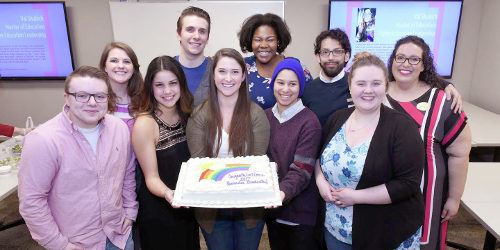BY DREW HOWARD

Grace Wojcik, Coordinator at the Gender and Sexuality Center is in back row last person on the right. She is celebrating with Students during Lavender Graduation. Photo courtesy of OU Gender and Sexuality Center.
Oakland University today is recognized as one of the most welcoming and inclusive campuses in the state for LGBTQ individuals. In August, OU earned the no. 1 slot on the 2017 Campus Pride Index, which ranks colleges and universities campuses according to LGBTQ-friendliness.
But backtrack 13-odd years into the campus's history, and what you'll find is a university that's hardly recognizable compared to what you see today. You might say the community was under the radar on campus until 2004, when OU began implementing LGBT-friendly training modules for its staff. This was the same year a group of students took it upon themselves to petition for a space on campus geared specifically toward welcoming all identities.
The petition resulted in the creation of the Gender and Sexuality Center in 2005, a space that has helped mold OU into the LGBTQ-friendly establishment it is today. But when the center first began operations, the space was little more than, well, a space.
"When we started out it was just a space for people to hang out," said Grace Wojcik, Coordinator at the Gender and Sexuality Center. "We didn't build much long-term programming or work that assessed the needs of the students."
This didn't stop the volunteers from laying important groundwork for future work. In 2008, the center established the university's and state's first LGBT peer-mentoring program. The program facilitates one-on-one mentoring relationships for new LGBT students who seek a smooth transition into college. And in 2009, OU changed the phrasing in its equal opportunity policy to include "gender identity" and "gender expression."
The center's Facebook page includes a list of "milestones," one of them being the addition of Wojcik to the team in 2011. Dubbing the new hire a milestone feels fitting when you consider all the programs implemented since Wojcik started.
In her time as the center coordinator, Wojcik and her team have made strides in raising awareness of the LGBT community through a variety of events. This includes OU's first Pride Week, the creation of a promotional campaign titled "Out on Campus," guest speaker events from the likes of Laverne Cox and Ryan Sallans, as well as a continuing series of graduation celebrations designed for LGBT students.
Out of all the programs offered by the center, Wojcik said Lavender Graduation has to be her favorite. The event was created to celebrate the achievements of LGBTQ undergraduate seniors, graduate, and medical students.
"It's become more of a thing people hope to participate in," Wojcik said. "We ask students where they're headed in the future and let them give words of advice to folks who are still here. It's grown tremendously. It's really being able to celebrate the achievements of students that's so special."
Flavia DiStefano is one of the three peer mentors at the GSC. He describes the peer mentor's role as a sort of guide who helps students navigate both their academic and social life.
"It was important for me to join the program because I wanted to offer the same kind of support and welcoming environment I had been given when I first came to Oakland University," DiStefano said. "I want the students to be as comfortable and safe as they can be around campus, and I think the GSC mentoring program is a big part of that. It helps the students grow and develop new interests and skills while being themselves."
The GSC also facilitates OU's Pride Week every first week of April. This year's celebration featured the 14th annual drag show, the "Slam for Solidarity" evening of poetry, spoken word and story-telling, as well as a Pride Prom.
Such events and programs helped earn the four-and-a-half star rating out five on the Campus Pride Index, a half-point jump from 2016.
Jo Reger, director of the Women and Gender studies program, said she's seen OU evolve significantly in its attitude toward the LGBTQ community since she joined the university.
"I came in 2001 and there was one LGBTQ orientated student group – no faculty or staff groups and no Gender and Sexuality Center," Reger said. "I have seen the university become exponentially more welcoming over time. In part, this was due to students and faculty who were out on campus and allies who worked with them to gain LGBTQ visibility and educate the rest of campus."
Wojcik said she's seen more departments and their staff take on additional responsibility in their work for the LGBTQ community, rather than directing all matters toward the GSC. She's also seen the reputation of the GSC change dramatically over the years, saying the center is now seen as the "go-to resource" on campus.
"What makes us unique is that we received the highest score on the campus pride assessment in Michigan, yet we only have one professional staff member," Wojcik said. "We don't have an extraordinary budget, but we build bridges across campus."
Despite working on a small budget, Wojcik still has big plans for the center down the road. She said she hopes to soon expand OU's Pride Week celebration into a Pride Month. She's also looking to grow the GSC's staff in an effort to heighten the center's impact on campus.
"The Gender and Sexuality Center may be geared at students but its existence changes the culture of OU for everyone here, including faculty, staff, administrators, LGBTQ individuals and allies," Reger said. "It is a centerpiece of campus."










